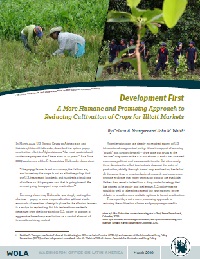Development First
A More Humane and Promising Approach to Reducing Cultivation of Crops for Illicit Markets
March 2010
 Development First demonstrates why it is no coincidence that policies that worsen poverty and undermine governance cannot achieve their drug control aims. This report identifies ten lessons learned for promoting alternative livelihoods, based on decades of evidence in countries from Thailand and Burma to Afghanistan and the Andes. Among the lessons is that proper sequencing is crucial: development must come first. Also, development assistance should not be made contingent on the prior elimination of coca or poppy crops. As has been the case in Colombia, such policies deny aid to precisely those communities most dependent on growing crops for illicit markets and in greatest need of assistance.
Development First demonstrates why it is no coincidence that policies that worsen poverty and undermine governance cannot achieve their drug control aims. This report identifies ten lessons learned for promoting alternative livelihoods, based on decades of evidence in countries from Thailand and Burma to Afghanistan and the Andes. Among the lessons is that proper sequencing is crucial: development must come first. Also, development assistance should not be made contingent on the prior elimination of coca or poppy crops. As has been the case in Colombia, such policies deny aid to precisely those communities most dependent on growing crops for illicit markets and in greatest need of assistance.
![]() Download the report (PDF)
Download the report (PDF)






